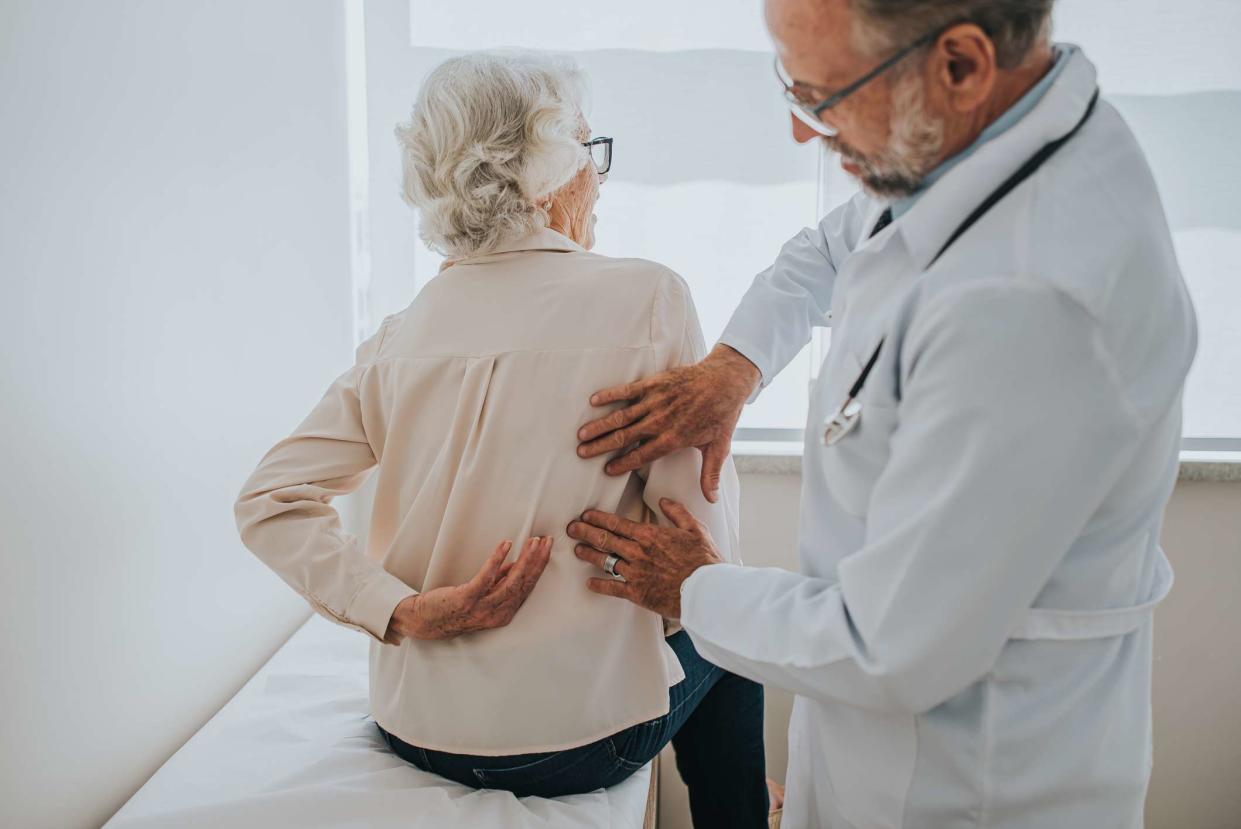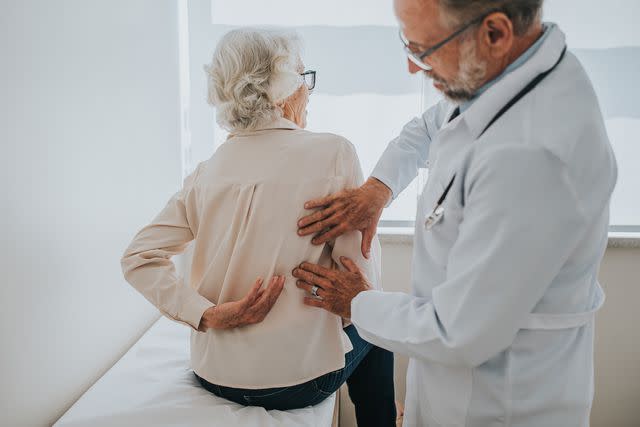Can Diverticulitis Pain Radiate to Your Back?

andreswd / Getty Images
Medically reviewed by Forest Miller, MSOT, OTR/L
Back pain is not a common symptom of uncomplicated diverticulitis. If you have diverticulitis and experience back pain, another cause may be responsible, or a complication may have developed.
As people age, diverticular disease becomes more common. "Diverticulosis" is the term used to describe when there are diverticula (small pouches) in the lining of the colon.
This condition doesn’t usually cause any symptoms. However, if the diverticula become infected or inflamed, abdominal pain and other symptoms can result, which is called diverticulitis. Diverticulitis usually needs treatment, though it can normally be done at home and not in the hospital.
This article will discuss how back pain may be a part of diverticulitis, when to seek care, and how to treat the pain at home.

andreswd / Getty Images
Diverticular disease is diagnosed when there are diverticula in the colon. Uncomplicated diverticulitis is when the diverticula become inflamed or infected and there are no complications. Complicated diverticulitis is when there is also another problem (such as an abscess, peritonitis, an obstruction, a stricture, or a fistula) involved.
What Does Diverticulitis Back Pain Feel Like?
The location of the colon can mean that pain caused by a disease or condition there, including diverticular disease, could lead to back pain. However, back pain is not a common symptom of diverticulitis. Abdominal pain tends to be the main symptom. This pain is often aching or cramping.
If there is back pain, it is possible that it is caused by a complication of diverticulitis or by another condition. Two conditions with similar symptoms as diverticulitis that also cause back pain are pancreatitis or an ovarian cyst.
Constipation is a complication that can occur with diverticulitis. As many as 50% of people who have diverticulitis also have constipation. This could also cause back pain.
How to Tell If Your Back Pain Is Caused by Diverticulitis
It’s unlikely that back pain would be the only symptom of diverticulitis. There will usually be other symptoms that are caused by a diverticulitis flare-up.
Diverticulitis usually isn't an emergency. However, complicated diverticulitis may need to be treated in the hospital. Severe pain, vomiting or diarrhea that won't stop, constipation that continues for several days, or severe bleeding are all reasons to seek care immediately.
Additional Diverticulitis Flare-Up Symptoms
Some of the other symptoms that can occur with diverticulitis include:
Abdominal pain (anything from mild and intermittent to severe and constant)
Constipation
Diarrhea
Fever
Nausea
Tender abdomen
Urinary symptoms
Vomiting
How Long Do Flares Last?
With uncomplicated diverticulitis, most people feel better after about two weeks. Some people may go on to have lingering abdominal pain or other symptoms. It’s important to have regular visits with a healthcare provider to get those symptoms addressed.
Diagnosing Diverticulitis
If it’s known that someone has diverticula in their colon or they have had a diverticulitis flare-up before, it might not take a lot of testing to diagnose diverticulitis. In these cases, diverticulitis may be diagnosed by a healthcare provider based on symptoms and a physical exam of the abdomen.
Diverticulitis has similar symptoms to many other conditions. For that reason, testing might be needed to make the diagnosis or to ensure it is diverticulitis.
Some tests that may be performed include:
Blood tests: In diverticulitis, a protein in the blood called C-reactive protein (CRP) may be higher than normal. CRP is measured with a blood test. A healthcare provider might also order other types of blood tests.
Urine test: Urine might be tested to rule out an infection as the cause of the symptoms.
Digital rectal exam: A healthcare provider may examine the anal area and insert a gloved, lubricated finger into the anus. This helps find problems in the anus or rectum and can show if there is blood or mucus in the stool.
Stool test: This test might be used to rule out an infection in the colon as a reason for the symptoms.
Computed tomography (CT) scan: A CT scan is a test that creates an image of the organs in the abdomen to look for problems. This test can be used to diagnose diverticulitis.
Colonoscopy: A colonoscopy won’t usually be done while diverticulitis is flaring. However, one is usually conducted several weeks after symptoms start to be sure there are not any other problems in the colon.
Ultrasonography: An abdominal ultrasound can be used to diagnose diverticulitis. But it may not be available in some areas.
Magnetic resonance imaging (MRI): An MRI can diagnose diverticulitis, but because of the time they take and the expense, it might not be used as often as a CT scan or ultrasound.
Is Diverticulitis Back Pain Serious?
Back pain while having a diverticulitis flare-up is important to discuss with a healthcare provider. This is because it is not a common symptom of uncomplicated diverticulitis. It could be a sign of another problem either because of the diverticulitis or in addition to it.
Complications
Some potential complications of diverticulitis may lead to back pain or referred pain, including:
Abscess: A pocket of pus somewhere in the body
Bowel obstruction: A blockage in the intestine preventing stool from moving through
Bowel stricture: A narrowing of the inside of the intestine
Fistula: An abnormal tunnel between two organs
When to Get Care
When diverticulitis symptoms start, it’s important to seek care from a healthcare provider. Even if it’s not the first time it has happened. Getting a diagnosis will ensure that the right care is put in place.
Other problems can co-occur with diverticulitis. A different type of treatment might be needed if there is a complication, such as an abscess or a fistula.
Making and keeping follow-up appointments after feeling better from diverticulitis is important. A healthcare provider can help define the next steps regarding lifestyle and diet, ensure there aren’t any other problems in the digestive tract, and help you understand how to avoid flare-ups in the future.
For symptoms that include severe abdominal pain, bleeding, vomiting that won’t stop, or diarrhea or constipation that has gone on for several days, seek care right away. Severe symptoms are a reason to go to the emergency department because some complications of diverticulitis can be serious.
Diverticulitis Back Pain Relief
There are a few different ways that back pain can be treated at home.
Tylenol (acetaminophen) is an over-the-counter (OTC) pain reliever that might be used. Nonsteroidal anti-inflammatory drugs (NSAIDs) like Advil or Motrin (ibuprofen) usually are not recommended during a flare-up of diverticulitis. Talk to a healthcare provider about pain relief choices.
A heating pad is another common and simple way to relieve pain. Heating pads have not been studied in diverticulitis. It’s important to follow the directions to avoid skin irritation.
In some cases, a healthcare provider may recommend a liquid diet while recovering from a flare-up. There is evidence that a low-fiber diet may also be followed without causing any harm. However, some people feel better with a liquid diet. Once recovered, a diet high in fiber and low in red meat and sweets or a vegetarian diet may help prevent a recurrence.
Prescription pain medications are not often used when diverticulitis is treated at home. Options for pain relief should be discussed with a healthcare provider.
Summary
Back pain is not common with diverticulitis. People who have back pain will want to talk to their healthcare provider to make sure that the pain is not caused by a complication. Pain relief might be found through acetaminophen, a heating pad, or some changes to diet. Pain that lasts more than a few days or is severe should be discussed with a healthcare provider.

